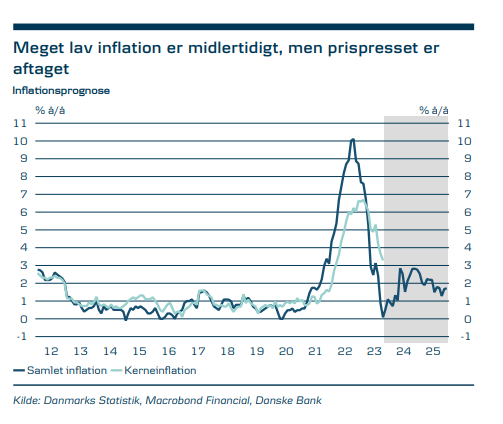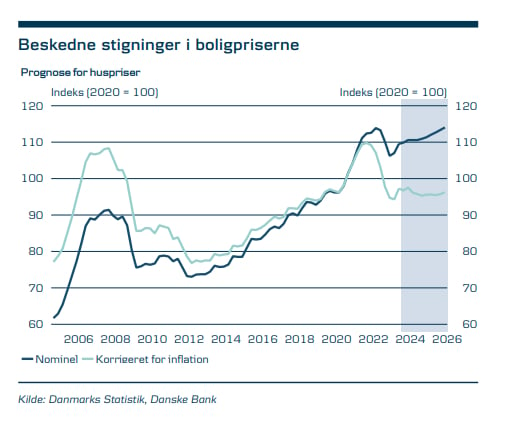What will happen in Denmark's economy in 2024?

Denmark is expected to enjoy the second highest growth rate in the EU in 2024, as the continuing success of Novo Nordisk's new weight-loss drug makes up for otherwise declining exports.
Slowdown not depression
According to Eurostat, Denmark's Gross Domestic Product (GDP) will grow 1.4 percent in 2024, a rate beaten only by Cyprus on 2.1 percent, and which, together with Ireland (0.6 percent) and Portugal (0.1 percent), makes it one of only four countries in the EU expected to enjoy positive growth.
In its forecast for the year, Danske Bank put the economy's resilience down to the exceptional success of Novo Nordisk's new product, Wegovy.
"The Danish economy is particularly strong and GDP growth is significantly higher than in most other EU countries," the bank wrote in its Nordic Outlook from December. "This is primarily due to the great success of Novo Nordisk and the rest of the pharmaceutical industry."
But, the bank wrote, the rest of the economy was undergoing a similar slowdown to the rest of Europe.
"The reality for the broad range of companies is far more mixed," it wrote. "Economically, the development in Denmark is reminiscent of what we see in many other places in Europe, only with Novo Nordisk on top."
"Novo Nordisk," the bank explained, "will, by all accounts, continue to have such high growth in production, that it will drag the total Danish GDP up, even if it's hard to say by how much."
The hotel and restaurant and tourism industries are expected to continue the growth they experienced in 2023, while Denmark's other export industries are increasingly struggling, weighed down by weak global demand.
The strong Danish krone, the bank said, was hurting the competitiveness of Danish exporters, especially when competing against rivals in Sweden, where the Swedish krona is very weak.
As a result of the falling order books reported by exporters, the bank in December reduced its 2024 growth prognosis from 1.7 percent to 1.1 percent.
Interest rates set to begin to fall
Inflation has fallen more sharply in Denmark than many expected. Inflation had fallen to 0.1 percent in Octover 2023, the bank reported, predicted that over the whole of 2023 it would end up at about 3.3 percent, before falling to 1.9 percent in both 2024 and 2025.
"Inflation has fallen extremely rapidly this year, also faster than in most other countries," Danske Bank wrote.
The bank expects Danmarks Nationalbank, the country's central bank, to shadow the interest rate decisions of the European Central Bank (ECB) in 2024 so that the Danish krone remains stable against the euro.
Last year it raised rates slightly less than the ECB -- to 4.2 percent compared to the ECB's 4.5 percent -- hoping to weaken the overly strong krone.

A Danske Bank graphic showing how sharply inflation has fallen in Denmark. Photo: Danske Bank
Resilient property market to stay resillient
The prices of houses and flats in Denmark have continued to grow in 2023 even as they fall in most other countries, with Danske Bank expecting them to have grown on average by about 1.5 percent in 2023. The bank expects house and apartment prices to continue to grow at this pace, increasing by 1.5 percent again in 2024.
This growth depends on the soft landing for the Danish economy continuing.
"If there is a harder landing, then we could see renewed falls in the price of housing," the bank warned. "If the economy sees greater setbacks, we see properties in the more expensive areas most exposed to a fall in prices."
More expensive areas could also see prices negatively affected next year when the new property tax comes into force, the bank added.

A Danske Bank graphic showing how property prices recovered in 2023 following a dip in 2022. Photo: Danske Bank
Employment to remain strong
Denmark's employment rate was "exceptionally high" in the first half of 2023, Eurostat said in its country profile, and according to Danske Bank there has been "quite a sharp increase in the labour force, especially due to the influx of foreign labour".
But the after starting to increase in the second half of the year, both Eurostat and Danske Bank expects unemployment to start increasing in 2024, as struggling exporters lay off staff, with the unemployment rate, according to Eurostat, climbing from 4.6 percent in 2023 to 5.2 percent in 2024 and 5.5 percent in 2025.
Dankse Bank points out that wages will also increase in 2024 as a result of collective bargaining agreements struck between unions and employers in 2023, which, it warned, would further hurt Danish competitiveness.
"Wage growth over the coming years will probably be higher than with Denmark's trading partners, and competitiveness will thus be eroded after having improved in recent years," it said.
Comments
See Also
Slowdown not depression
According to Eurostat, Denmark's Gross Domestic Product (GDP) will grow 1.4 percent in 2024, a rate beaten only by Cyprus on 2.1 percent, and which, together with Ireland (0.6 percent) and Portugal (0.1 percent), makes it one of only four countries in the EU expected to enjoy positive growth.
In its forecast for the year, Danske Bank put the economy's resilience down to the exceptional success of Novo Nordisk's new product, Wegovy.
"The Danish economy is particularly strong and GDP growth is significantly higher than in most other EU countries," the bank wrote in its Nordic Outlook from December. "This is primarily due to the great success of Novo Nordisk and the rest of the pharmaceutical industry."
But, the bank wrote, the rest of the economy was undergoing a similar slowdown to the rest of Europe.
"The reality for the broad range of companies is far more mixed," it wrote. "Economically, the development in Denmark is reminiscent of what we see in many other places in Europe, only with Novo Nordisk on top."
"Novo Nordisk," the bank explained, "will, by all accounts, continue to have such high growth in production, that it will drag the total Danish GDP up, even if it's hard to say by how much."
The hotel and restaurant and tourism industries are expected to continue the growth they experienced in 2023, while Denmark's other export industries are increasingly struggling, weighed down by weak global demand.
The strong Danish krone, the bank said, was hurting the competitiveness of Danish exporters, especially when competing against rivals in Sweden, where the Swedish krona is very weak.
As a result of the falling order books reported by exporters, the bank in December reduced its 2024 growth prognosis from 1.7 percent to 1.1 percent.
Interest rates set to begin to fall
Inflation has fallen more sharply in Denmark than many expected. Inflation had fallen to 0.1 percent in Octover 2023, the bank reported, predicted that over the whole of 2023 it would end up at about 3.3 percent, before falling to 1.9 percent in both 2024 and 2025.
"Inflation has fallen extremely rapidly this year, also faster than in most other countries," Danske Bank wrote.
The bank expects Danmarks Nationalbank, the country's central bank, to shadow the interest rate decisions of the European Central Bank (ECB) in 2024 so that the Danish krone remains stable against the euro.
Last year it raised rates slightly less than the ECB -- to 4.2 percent compared to the ECB's 4.5 percent -- hoping to weaken the overly strong krone.

Resilient property market to stay resillient
The prices of houses and flats in Denmark have continued to grow in 2023 even as they fall in most other countries, with Danske Bank expecting them to have grown on average by about 1.5 percent in 2023. The bank expects house and apartment prices to continue to grow at this pace, increasing by 1.5 percent again in 2024.
This growth depends on the soft landing for the Danish economy continuing.
"If there is a harder landing, then we could see renewed falls in the price of housing," the bank warned. "If the economy sees greater setbacks, we see properties in the more expensive areas most exposed to a fall in prices."
More expensive areas could also see prices negatively affected next year when the new property tax comes into force, the bank added.

Employment to remain strong
Denmark's employment rate was "exceptionally high" in the first half of 2023, Eurostat said in its country profile, and according to Danske Bank there has been "quite a sharp increase in the labour force, especially due to the influx of foreign labour".
But the after starting to increase in the second half of the year, both Eurostat and Danske Bank expects unemployment to start increasing in 2024, as struggling exporters lay off staff, with the unemployment rate, according to Eurostat, climbing from 4.6 percent in 2023 to 5.2 percent in 2024 and 5.5 percent in 2025.
Dankse Bank points out that wages will also increase in 2024 as a result of collective bargaining agreements struck between unions and employers in 2023, which, it warned, would further hurt Danish competitiveness.
"Wage growth over the coming years will probably be higher than with Denmark's trading partners, and competitiveness will thus be eroded after having improved in recent years," it said.
Join the conversation in our comments section below. Share your own views and experience and if you have a question or suggestion for our journalists then email us at [email protected].
Please keep comments civil, constructive and on topic – and make sure to read our terms of use before getting involved.
Please log in here to leave a comment.